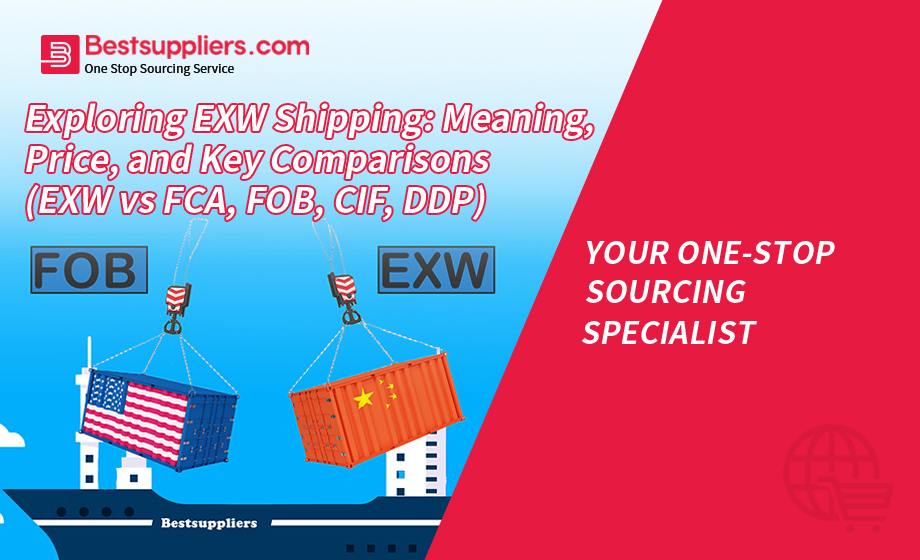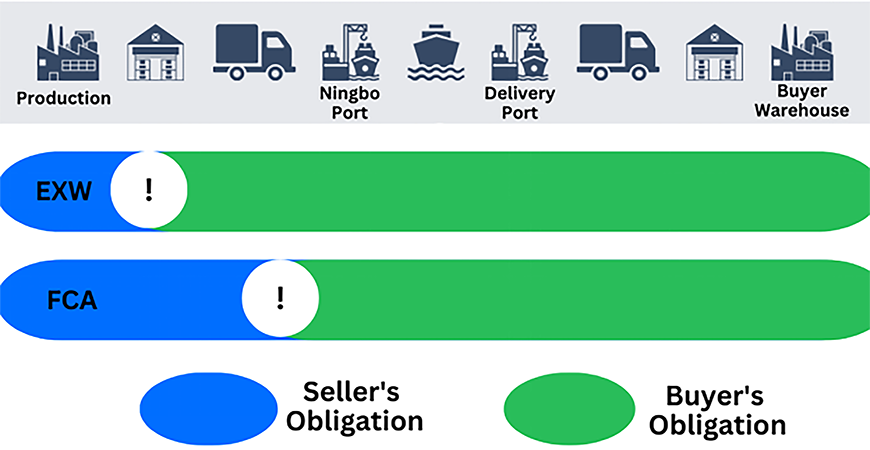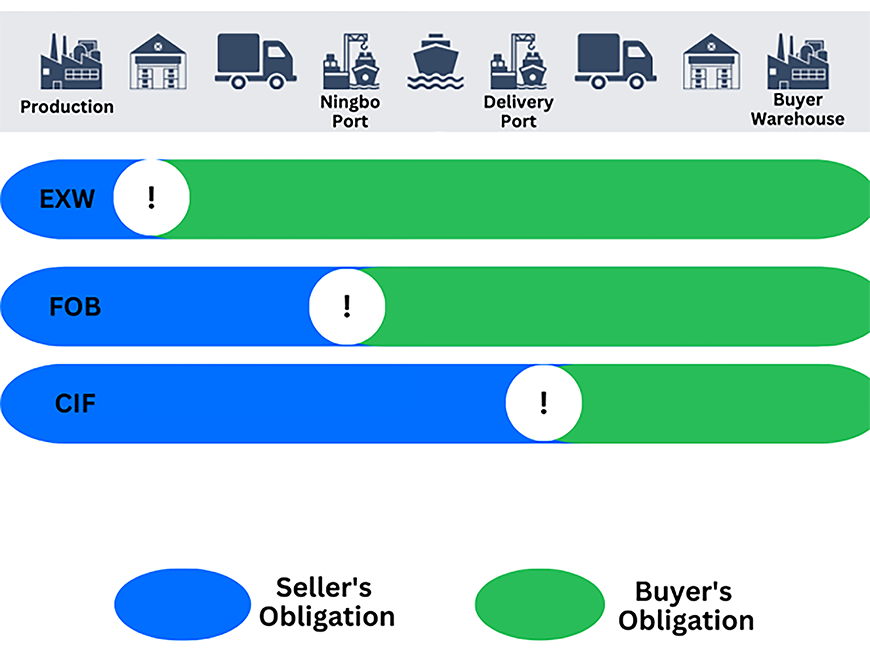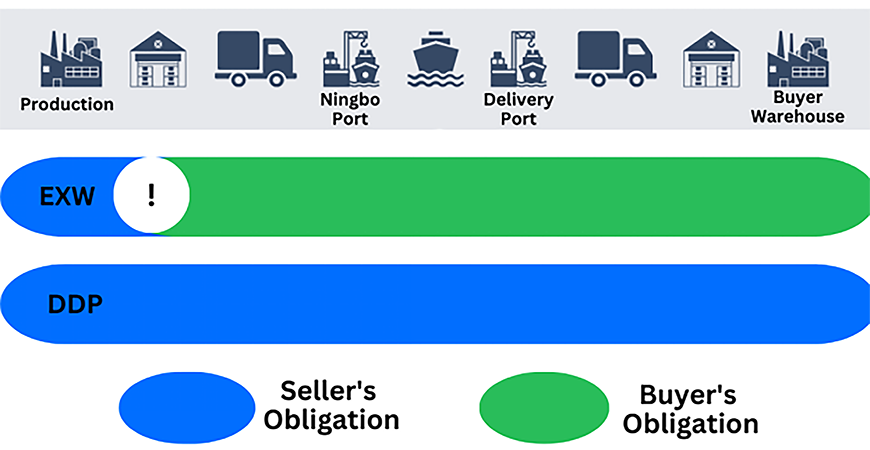Exploring EXW Shipping: Meaning, Price, and Key Comparisons (EXW vs FCA, FOB, CIF, DDP)

Understanding EXW: Definition and Meaning:
EXW, or Ex Works, is an international trade term that represents the point at which the seller fulfills their obligations by making the goods available at their premises or another agreed-upon location. To better comprehend EXW, let's consider an example involving a seller in Yiwu, China, and a buyer in New York, USA.
In this scenario, the seller, located in Yiwu, China, agrees to an EXW shipping arrangement with the buyer in New York. As per the terms, the seller's responsibility is to make the goods available at their premises in Yiwu. Once the goods are ready, the buyer takes full control of the logistics, including organizing and paying for the transportation from Yiwu to New York, as well as handling all export and import procedures.
The EXW terms define that the seller's obligations end once the goods are made available at their location in Yiwu. From that point onward, the buyer assumes ownership, bears the associated costs, and takes on the risks of transporting the goods to their desired destination in New York. The buyer may choose their preferred shipping method, engage a freight forwarder, and manage the necessary customs procedures to ensure a smooth importation process.
EXW Price in Shipping: What Is EXW Price?
The EXW price, also known as the Ex Works price, represents the cost of the goods at the point of origin, excluding any transportation, insurance, or other associated costs. It encompasses the manufacturing or production cost of the goods and is typically agreed upon between the buyer and the seller. Understanding the components of the EXW price is crucial for accurately assessing the total costs involved in an international trade transaction.
Let's expand on the example mentioned earlier, where a buyer in New York, USA, purchases goods from a seller located in Yiwu, China, under the EXW shipping terms. In this scenario, the EXW price will consist of several factors:
Manufacturing or Production Cost: This cost covers various elements such as raw materials, labor, overhead expenses, and any applicable profit margin.
Packaging and Preparation: The seller is responsible for ensuring that the goods are adequately packaged and prepared for transportation.
Handling and Loading: While the buyer assumes responsibility for the transportation, the seller may still incur costs related to handling and loading the goods onto the buyer's chosen vehicle.
It's important to note that the EXW price does not include costs associated with transportation, insurance, or any subsequent charges incurred after the goods have left the seller's premises. These costs, including freight charges, insurance fees, export and import duties, and any other related expenses, are the responsibility of the buyer.
The formula for Calculating EXW Price:
EXW Price = Manufacturing or Production Cost + Packaging and Preparation Cost + Handling and Loading Cost + Location Factors
When to Use EXW Shipping Terms?
While EXW can be applicable in various trade scenarios, there are specific situations where it is commonly used. Understanding when to use EXW shipping terms can help businesses streamline their operations and make informed decisions. Here are some instances where EXW is frequently employed:
Small-Scale Importers and Exporters:
EXW is often suitable for small-scale importers and exporters who prefer to take control of the entire logistics process. By using EXW terms, these businesses can arrange their preferred transportation, handle customs clearance, and have a higher level of flexibility in managing their shipments.
Local or Domestic Shipments:
When dealing with local or domestic shipments, where the buyer and seller are located in the same country or region, EXW can be a practical choice. It simplifies the process by allowing the buyer to collect the goods directly from the seller's premises or an agreed-upon location.
Control over Logistics and Freight Forwarding:
If the buyer has an established network of reliable logistics providers or freight forwarders and prefers to manage the transportation arrangements themselves, EXW terms offer the necessary flexibility and control.
EXW vs FCA: Key Differences:
Transfer of Responsibility and Risk:
One notable difference between EXW and FCA (Free Carrier) is the point at which the responsibility and risk transfer from the seller to the buyer. In EXW, the transfer occurs when the goods are made available at the agreed-upon location, typically the seller's premises. In contrast, FCA entails the transfer of responsibility and risk to the buyer once the goods are delivered to the carrier, which could be a specified location other than the seller's premises.

Transportation and Delivery:
EXW places the responsibility for transportation on the buyer, who must organize and pay for the transportation from the seller's location to the destination. In contrast, FCA requires the seller to deliver the goods to a specified carrier chosen by the buyer. The seller handles the loading of goods onto the carrier and assumes responsibility until that point.
Documentation and Customs Clearance:
Another difference lies in the documentation and customs clearance process. With EXW, the buyer takes full responsibility for ensuring compliance with all necessary documentation and procedures for export and import clearance. In the case of FCA, the seller is responsible for providing the necessary documentation for export clearance, while the buyer assumes responsibility for import clearance.
EXW vs FOB: Comparative Analysis:
Ownership and Risk Transfer:
One significant distinction between EXW and FOB (Free On Board) lies in the transfer of ownership and risk. Under EXW, ownership and risk transfer to the buyer once the goods are made available at the agreed location. In contrast, FOB transfers ownership and risk to the buyer when the goods are loaded onto the vessel at the port of shipment.
Transport and Delivery Arrangements:
EXW places the responsibility of transportation entirely on the buyer. The buyer must organize and bear the costs of transporting the goods from the seller's location to the desired destination. In FOB, the seller is responsible for the delivery of goods to the port of shipment, including the costs and arrangements involved.
Cost and Liability Distribution:
In terms of costs and liabilities, EXW places a heavier burden on the buyer. The buyer bears the costs and liabilities associated with transportation, insurance, customs clearance, and any potential risks during transit. FOB, on the other hand, sees the seller covering the costs and liabilities up to the point of loading the goods onto the vessel at the port of shipment.
EXW vs CIF: Differentiating Factors:
Inclusion of Insurance and Freight:
One key difference between EXW and CIF (Cost, Insurance, and Freight) is the inclusion of insurance and freight charges. With EXW, insurance and freight costs are the responsibility of the buyer, who must arrange and pay for them separately. CIF, on the other hand, requires the seller to cover the costs of insurance and freight to transport the goods to the port of destination.

Responsibilities and Costs:
EXW places a greater level of responsibility and costs on the buyer compared to CIF. With EXW, the buyer is responsible for arranging transportation, paying for insurance, and handling customs clearance. In CIF, the seller takes on more responsibilities, including organizing transportation, providing insurance coverage, and managing export and import clearance procedures.
EXW vs DDP: Contrasting Features:
Comprehensive Door-to-Door Delivery:
One significant difference between EXW and DDP (Delivered Duty Paid) lies in the scope of delivery. While EXW only requires the seller to make the goods available at their premises or an agreed-upon location, DDP entails a comprehensive door-to-door delivery. Under DDP terms, the seller is responsible for delivering the goods to the buyer's designated location, including handling import duties and taxes.
Import Duties and Taxes:
In terms of import duties and taxes, EXW places the responsibility on the buyer, who must handle the necessary customs clearance and payment of applicable duties and taxes. In contrast, DDP shifts the responsibility to the seller, who takes care of the import duties and taxes as part of the comprehensive delivery.

Pros and Cons of EXW Shipping:
Advantages of EXW Shipping:
Gives the buyer control over logistics and freight forwarding.
Offers flexibility in choosing transportation methods and freight forwarders.
Enables cost savings by allowing the buyer to negotiate favorable shipping rates.
Provides a clearer separation of responsibilities between buyer and seller.
9.2. Disadvantages of EXW Shipping:
This places a heavier burden on the buyer for arranging transportation and associated costs.
Requires the buyer to handle export and import clearance procedures.
May involve additional complexities and risks if the buyer lacks experience in managing logistics.
Conclusion:
In conclusion, understanding EXW shipping terms is crucial for businesses engaged in international trade. EXW provides a clear framework for the transfer of goods from the seller to the buyer, with the buyer assuming responsibility for transportation, customs clearance, and associated costs. By grasping the meaning of EXW, knowing when to use it, and making informed comparisons with other shipping terms like FCA, FOB, CIF, and DDP, businesses can navigate their trade transactions effectively and optimize their logistics operations. The key is to carefully consider the specific requirements of each transaction and choose the shipping term that aligns best with their objectives and capabilities.

